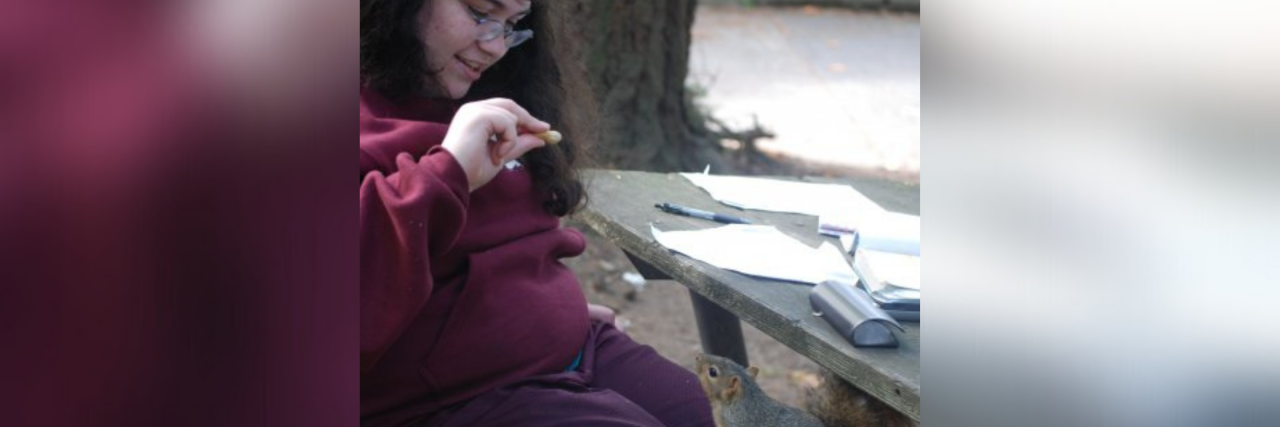When I moved to the Boston area to attend college, one thing immediately captivated me: The squirrels! Gray behemoths who would devour everything from pizza slices bigger than they were to brownies the size of their heads. I would sometimes peer into a trash bin where one was foraging, and proclaim, “I know you’re in there!” as she would bound out with her latest squirreled-away treat. Then, in the evening, I would count as many as 13 fluffy rodents in my line of sight who would congregate on Wellesley College’s academic quad, and I would stare in amazement at their perfectly curved squirrel bodies. Thus began a fascination with the bushy-tailed critters which has spanned half of my life.
Eventually transferring schools, in 2010, I would dedicate my Reed College senior thesis to the best of all squirrel friends, Violet, as well as a few other bushy-tailed critters on campus, some of whom were given to sitting on my lap while they enjoyed an afternoon snack. Part of my obsession amounts to accumulating squirrel art; one of my favorite recent acquisitions is the original Bernie Squirrel, a 5 x 7 watercolor by Pennsylvania artist Sam Georgieff, a spinoff of the Bernie Sanders mittens meme, except featuring a squirrel in gloves and a green jacket.
During the 18 years of my obsession, plenty of people have tried to “talk sense” into me about my autistic special interest. One young man approached me at Reed and lectured me about how I could be learning a trade with the time I was spending photographing bushy-tailed rodents. This individual had neglected to recognize that I was teaching myself photography through these endeavors, which has merited me a fair share of awards even as a hobbyist.
When I was formally diagnosed with autism just a few months ago, my cognitive therapist explained that as long as it wasn’t interfering with my other activities, that I could focus on squirrels as much as I wanted. Unfortunately, after asking me to track how many hours I was spending on my obsession, she condescendingly remarked that I was passing too much time on my special interest. The fact was that it was not affecting me negatively, so why should she act with such an air of superiority? While in the past I have felt pain that people would be so judgmental, there is little that will stand in the way of my 18-year-long obsession.
Although other people may cast aspersions on our passions, the bottom line is that autistic people should embrace who we are. Our knowledge of our special interests augments human understanding about why things are the way they are. Our passion adds to the diverse tapestry of human experiences. There is nothing wrong with having a subject — or a few — about which one is extremely devoted. Neurotypical people tend to be evangelistic about what we autistics should be doing, how we should conduct our lives and what our schedules should look like.
My retort is that if someone is happy engaging in her passion for squirrels, baseball or politics, what right does an allistic person have to tell her that she should be spending her time any differently? So long as we still allocate hours for daily tasks, no one should squelch a beautiful aspect of our neurotype. Since we are not doing any harm, my message to neurotypicals is that they should stop trying to get us to performatively reject who we are. My passion for squirrels makes me a more interesting, fun and happy human, and I have no space in my life for evangelistic allistics. As a matter of fact, I now completely disregard what they say.
So, my fellow neurodivergent people, go forth, bright-eyed and bushy-tailed, and enjoy your special interests!

